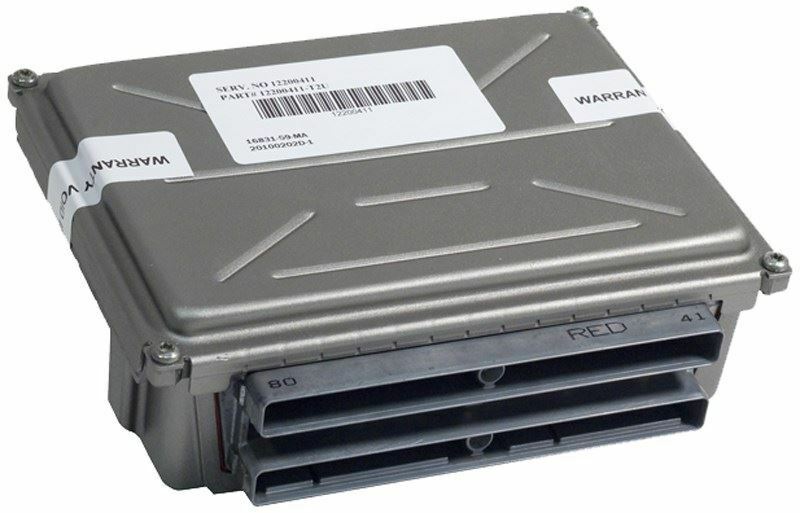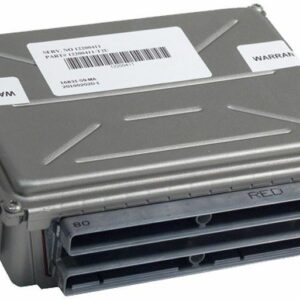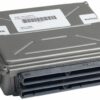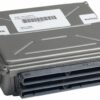Restore Your Corvette’s Heart and Soul
There’s nothing more frustrating than when your C5 Corvette—a machine built for precision and performance—starts acting up. Maybe it’s an intermittent no-start condition that leaves you stranded, a persistent Check Engine Light that won’t go away, or a noticeable drop in power and fuel economy. These aren’t just annoyances; they’re signs that the brain of your vehicle, the Powertrain Control Module (PCM), may be failing. As a technician with over two decades of experience under the hood, I’ve seen how a faulty PCM can turn a thrilling drive into a diagnostic nightmare. That’s why we offer a straightforward, reliable solution: a replacement 2004 Corvette Powertrain Control Module, professionally programmed to your vehicle’s specific VIN before it even leaves our facility.
Case Study: A Tricky Diagnosis
I remember a 2004 Corvette that came into the shop with a ghost of a problem. The owner complained of random stalling at traffic lights and occasional hard starting, but with no consistent trouble codes. We checked the fuel pressure, ignition system, and sensors—all tested fine. The issue was so intermittent it was nearly impossible to replicate. Finally, during a long test drive with a high-end scanner, we caught a momentary data loss from the PCM. The internal processor was failing under specific heat conditions. Swapping in a VIN-programmed PCM like this one didn’t just fix the problem; it restored the car’s crisp throttle response and the owner’s confidence. This is a common failure mode, and this module is the definitive fix.
Is Your Corvette Showing These Signs of PCM Failure?
A failing engine computer can manifest in numerous ways. If you’re experiencing any of the following, a faulty PCM is a likely culprit. Look out for Diagnostic Trouble Codes (DTCs) like P0601, P0602, P0603, P0604, P0605, or P0606, which directly point to an internal module error.
- ✔ Check Engine Light is on or flashing
- ✔ Engine stalling, stuttering, or misfiring
- ✔ Vehicle won’t start, or is very difficult to start
- ✔ Noticeable decrease in fuel efficiency
- ✔ Poor or erratic automatic transmission shifting
- ✔ Loss of power and sluggish acceleration
- ✔ Communication errors with your OBD-II scan tool
A Straightforward Guide to Installation
One of the biggest benefits of our service is that this module arrives ready for installation, with no need for an expensive trip to the dealership. For a 2004 Corvette, the PCM is located in the engine bay on the passenger side. While professional installation is always an option, a confident DIYer can handle this job.
- Safety First: Disconnect the negative terminal from your vehicle’s battery and wait at least 15 minutes to ensure all systems are powered down.
- Locate the PCM: On your Corvette, open the hood and find the PCM located in the right-hand (passenger side) front of the engine compartment.
- Disconnect the Harnesses: Carefully release the locking tabs on the electrical connectors and gently pull them straight out from the module. Never force them. Inspect the connectors for any corrosion or damage.
- Remove the Old Module: Unbolt the mounting brackets holding the old PCM in place. Remove the old module from the vehicle.
- Install the New Module: Mount your new, pre-programmed PCM securely into the brackets.
- Reconnect Everything: Firmly plug the electrical harnesses back into the new module until they click into place. Reconnect the negative battery terminal.
- Final Steps: Your vehicle may require a security relearn procedure, which can typically be done without special tools by cycling the key. Instructions are widely available, or you can consult your service manual. Once complete, start the engine and enjoy your restored performance!
Verified Fitment Across a Range of GM Vehicles
While this is a direct-fit solution for the 2004 Corvette Powertrain Control Module, this versatile part (Service No. 12570557) is also compatible with a wide array of other GM trucks, vans, and SUVs. Please verify your part number or contact us to ensure compatibility for the following vehicles:
- Cadillac CTS (2004)
- Chevrolet Corvette (2004)
- Chevrolet Avalanche 2500 (2003)
- Chevrolet Silverado & Sierra 1500/2500/3500 (2003) – with 4.3L or 8.1L Gasoline engines
- Chevrolet Express & GMC Savana Vans 1500/2500/3500 (2003)
- Chevrolet Suburban & GMC Yukon XL 2500 (2003) – with 8.1L engines
- Chevrolet S10 / GMC Sonoma (2003) – with 4.3L engines
- Chevrolet Blazer / GMC Jimmy (2003)
- Chevrolet Astro / GMC Safari (2003)
Frequently Asked Questions
What exactly is VIN programming?
VIN programming is the process of loading your vehicle’s unique 17-digit Vehicle Identification Number (VIN) and its specific software onto the module. This ensures the PCM communicates correctly with your car’s engine, transmission, security system (like VATS), and options. We handle this for you, so it’s ready to install out of the box.
Will I need to do anything else after installing this module?
In most cases, you will not need to visit a dealer. The only potential step is a security relearn procedure (also known as a CASE relearn or Passlock relearn), which can often be performed by the vehicle owner by cycling the ignition key in a specific sequence. This syncs the new PCM with your vehicle’s anti-theft system.
How do I provide my VIN?
After you complete your purchase, you will need to send us your 17-digit VIN. You can typically add it as a note during checkout or reply to your order confirmation email. We cannot ship your part until we receive this information.
Is this a used part?
This is a high-quality, inspected, and tested replacement part that has been verified to meet or exceed original equipment specifications. It is programmed with the latest GM-certified software for your vehicle, ensuring reliable, long-term operation.
What if my part number doesn’t match 12570557 exactly?
This module replaces several service numbers, including 12581565, 12576106, and 89017733, among others. Please check the full list of compatible service numbers in our description or contact us with your original part number to confirm a match.



